Related Research Articles

According to the Abrahamic religions, Aaron was a prophet, high priest, and the elder brother of Moses. Knowledge of Aaron, along with his brother Moses, comes exclusively from religious texts, such as the Bible and Quran.

Moses ben Maimon (1138–1204), commonly known as Maimonides and also referred to by the acronym Rambam, was a medieval Sephardic Jewish philosopher who became one of the most prolific and influential Torah scholars of the Middle Ages. In his time, he was also a preeminent astronomer and physician, serving as the personal physician of Saladin. Born in Córdoba, Almoravid Empire, on Passover eve, 1138, he worked as a rabbi, physician and philosopher in Morocco and Egypt. He died in Egypt on 12 December 1204, whence his body was taken to the lower Galilee and buried in Tiberias.
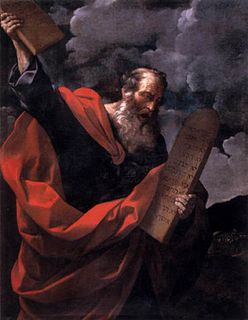
Moses is considered the most important prophet in Judaism and one of the most important prophets in Christianity, Islam, the Druze faith, the Baháʼí Faith and other Abrahamic religions. According to both the Bible and the Quran, Moses was the leader of the Israelites and lawgiver to whom the authorship, or "acquisition from heaven", of the Torah is attributed.
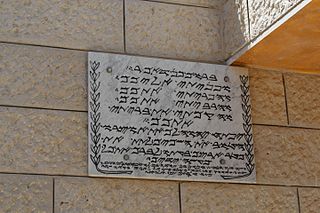
Samaritanism is the Abrahamic, monotheistic, ethnic religion of the Samaritan people, an ethnoreligious group who, alongside Jews, originate from the ancient Israelites. Its central holy text is the Samaritan Pentateuch, which Samaritans believe is the original, unchanged version of the Torah. In addition to the Samaritan Pentateuch, Samaritans also revere their version of the Book of Joshua and recognize some later Biblical figures such as Eli.

The Torah is the compilation of the first five books of the Hebrew Bible, namely the books of Genesis, Exodus, Leviticus, Numbers and Deuteronomy. In that sense, Torah means the same as Pentateuch or the Five Books of Moses. It is also known in the Jewish tradition as the Written Torah. If meant for liturgic purposes, it takes the form of a Torah scroll. If in bound book form, it is called Chumash, and is usually printed with the rabbinic commentaries.

Moses Mendelssohn was a German-Jewish philosopher and theologian. His writings and ideas on Jews and the Jewish religion and identity were a central element in the development of the Haskalah, or 'Jewish Enlightenment' of the eighteenth and nineteenth centuries. Born to a poor Jewish family in Dessau, Principality of Anhalt, and originally destined for a rabbinical career, Mendelssohn educated himself in German thought and literature. Through his writings on philosophy and religion he came to be regarded as a leading cultural figure of his time by both Christian and Jewish inhabitants of German-speaking Europe and beyond. His involvement in the Berlin textile industry formed the foundation of his family's wealth.
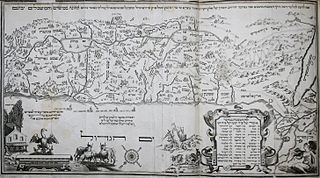
The Israelites were a confederation of Semitic-speaking tribes in the ancient Near East who, during the Iron Age, inhabited a part of Canaan.
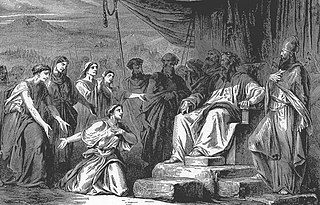
The Daughters of Zelophehad were five sisters – Mahlah, Noa, Hoglah, Milcah, and Tirzah – mentioned in the Biblical Book of Numbers. They lived during the Israelites' Exodus from Egypt as they prepared to enter the Promised Land and who raised before the Israelite community the case of a woman's right and obligation to inherit property in the absence of a male heir in the family. Zelophehad, a man of the Tribe of Manasseh, had five daughters but no sons, and therefore no male heirs.

Levi was, according to the Book of Genesis, the third of the six sons of Jacob and Leah, and the founder of the Israelite Tribe of Levi and the great-grandfather of Aaron, Moses and Miriam. Certain religious and political functions were reserved for the Levites.
According to the Bible, Gershom was the firstborn son of Moses and Zipporah. The name means "a stranger there" in Hebrew,, which the text argues was a reference to Moses' flight from Egypt. Biblical scholars regard the name as being essentially the same as Gershon and in the Book of Chronicles the progenitor of one of the principal Levite clans is sometimes identified as Gershom, sometimes as Gershon.
Tannaim were the rabbinic sages whose views are recorded in the Mishnah, from approximately 10–220 CE. The period of the Tannaim, also referred to as the Mishnaic period, lasted about 210 years. It came after the period of the Zugot ("pairs"), and was immediately followed by the period of the Amoraim ("interpreters").

Mayer Amschel Rothschild was a German Jewish successful banker and the founder of the Rothschild banking dynasty. Referred to as a "founding father of international finance", Rothschild was ranked seventh on the Forbes magazine list of "The Twenty Most Influential Businessmen of All Time" in 2005.
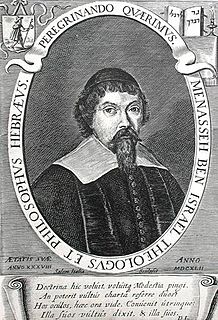
Manoel Dias Soeiro, better known by his Hebrew name Menasseh ben Israel, also, Menasheh ben Yossef ben Yisrael, also known with the Hebrew acronym, MB"Y or MBI, was a Portuguese rabbi, kabbalist, writer, diplomat, printer, publisher, and founder of the first Hebrew printing press in Amsterdam in 1626.

Rabbi Moses Isserles, also known by the acronym Rema, was an eminent Polish Ashkenazic rabbi, talmudist, and posek.

The Hebrew Bible makes reference to a number of covenants with God (YHWH). These include the Noahic Covenant, which is between God and all living creatures, as well as a number of more specific covenants with Abraham, the whole Israelite people, the Israelite priesthood, and the Davidic lineage of kings. In form and terminology, these covenants echo the kinds of treaty agreements in the surrounding ancient world.

Bevis Marks Synagogue, officially Qahal Kadosh Sha'ar ha-Shamayim, is the oldest synagogue in the United Kingdom in continuous use. It is located off Bevis Marks, Aldgate, in the City of London.
Judah ben Isaac Messer Leon (1166–1224) was a French tosafist born in Paris.
Neville Jonas Laski was an English judge and leader of Anglo-Jewry.

Sir Moses Haim Montefiore, 1st Baronet, was a British financier and banker, activist, philanthropist and Sheriff of London. Born to an Italian Sephardic Jewish family based in London, after he achieved success, he donated large sums of money to promote industry, business, economic development, education and health among the Jewish community in the Levant. He founded Mishkenot Sha'ananim in 1860, the first settlement outside Jerusalem's walled Old City.
The Asaṭīr, also known as the Samaritan Book of the Secrets of Moses, is a collection of Samaritan Biblical legends, parallel to the Jewish Midrash, and which draws heavily upon oral traditions known among Jews in the 2nd and 3rd centuries CE. Moses Gaster places its compilation about the middle or end of the third century BCE, and rendered a translation of the work in 1927 with the Royal Asiatic Society in London. Others have said that its language style resembles more the Arabic language used by the scholar Ab Ḥisda [Isda] of Tyre in his poems of the eleventh century CE, and place its composition in the second-half of the tenth-century. The book's title, Asatir, was thought by Gaster to mean "secrets," from which name, he applied to the book its newer title, "The Secrets of Moses." Even so, such an interpretation has nothing to do with the contents of the book, nor with its subject. A more precise translation of the Arabic title of the work, al-Asāṭīr, would be "legends" or "tales," as in the Koranic expression asāṭīr al-Awwalīn.
References
- ↑ Blackwell Reference Online – Moses of London (fl. 13th cent.)